In Japan, there's a money hand gesture that's very similar to the "OK" hand gesture in America: it's done by making a circle with the thumb and index finger.
Anime: Nisemonogatari 偽物語 (Episode 1)
- haa? kono yo ni okane igai nani ka aru-n-desu ka?
はぁ?この世にお金以外なにかあるんですか?
Hah? In this world, is there anything besides money?
This gesture is used not only to talk about hard cash, but also when talking about profits or other economic gains, about costs, things that are expensive, and so on. It just signifies money in general.
Warning: different cultures use the same gesture to signify different things. In Japan it's money, in America it's "OK," in some countries it's something obscene, and so on. Some culture also have different gestures for money, like rubbing the index and thumb together.
Origin
The origin of the money gesture seems to be the coin.
The Japanese sign for money starts from a completely different source. Money means coins and coins are circular. Therefore, making a circular hand-sign comes to signify money.[Peoplewatching: The Desmond Morris Guide to Body Language. Random House. pp. 49–52 via books.google.com]
In the past, the most common currency used in Japan was a circular coin. Not paper money like we have today. Metal coins that were circular, and definitely not rectangular. Perhaps from this fact the gesture became a thing.
Logically, if it does come from the coin, the gesture couldn't have been used before people started using coins, or in an alternate universe in which coins don't exist.
Since coins are circular, and they're currency, in Japan, and China as well, a kanji that means "circle" started being used to refer to the currency: en 圓. That's the traditional one, after an orthography reform, the modern variant is now this: en 円.
- marui
円い
Circular.
- marui
丸い
Round. (includes spherical.)
- marui
- enshuu
円周
Circumference. - enshuu-ritsu
円周率
Ratio of circumference. Pi. π. - entaku
円卓
Round table. (e.g. King Arthur's.)
- Context: Ryoutsu Kankichi 両津勘吉 hears how much a company is willing to pay for the last piece of land they need in order to build a whole edifice.
- juu oku en
10億円
Ten hundred-million yen.
One billion yen.- A note about numbers in Japanese:
- ichi-man 1万 is 10000, ten thousand.
- ichi-oku 1億 is 10000×10000, or one hundred million.
Fun fact: "money" in Japanese is okane お金, which shares a kanji with "gold," kin 金. The word referred to "gold coins," kinka 金貨. Coins minted out of silver, i.e. "silver coins," ginka 銀貨, were sometimes called ogin お銀 instead of okane.
The Chinese silver coin, which is also circular, is called, in Chinese, yínyuán 銀圓, "silver circles."
Examples
For reference, some examples of this money gesture in anime:
Anime: Osomatsu-san おそ松さん (Episode 6)
- Context: Osomatsu, one of Todomatsu's brothers, shamelessly asks their childhood friend who suddenly became rich for a share of their money.
- demo Osomatsu-niisan, shoujiki mimi wo utagatta yo
でもおそ松さん兄さん、正直耳を疑ったよ
[That said], brother Osomatsu, honestly [I] doubted [my] ears. (I thought I had misheard it.) - doushite sonna tensai-teki na hassou ga dekiru no?
どうしてそんな天才的な発想ができるの?
How can [you] have such genius ideas? - *gestures monetarily*
Right: Shibisu シビス, 십이수
Anime: "Tower of God," Kami no Tou 神之塔 (Episode 3)
- Shibisu makes a money gesture to pay for a drink in some sort of sci-fi palm-reading vending machine. It's uncertain whether he needed to make this gesture to activate the machine at all.
Right: Hanako 花子
Anime: Jibaku Shounen Hanako-kun 地縛少年花子くん (Episode 1)
- Context: Nene is asks Hanako to remove a curse from her, then Hanako tells her what he wants in exchange.
- odai wa karada de haratte morau yo
お代は体で払ってもらうよ
[I] will have [you] pay the price with [your] body. (common sexual double-entendre.) - higan to shigan no sakai wo koete
ore-tachi no en wa musubareta
彼岸と此岸の堺を超えて
俺達の縁は結ばれた
Crossing the boundary between this world and the next,
our fates were linked. - {kimi ga ukeru} noroi wa ore ga saiteigen ni osaete ageru
君が受ける呪いは俺が最低限に押さえてあげる
The curse [that] {you receive} [I] will suppress to the minimum. - kawari ni morau yo
代わりにもらうよ
In exchange [I] will take [it]. - kimi no...
君の・・・
Your... - roudouryoku
労働力
Labor. (as in physical labor, manpower.) - *gestures monetarily*
- Afterwards: Hanako, who is a spirit and can't touch physical objects, began using Nene, who has a physical "body," to interact with the physical world.
Right: "Village Girl," Mura-musume 村娘
Manga: Kemono Michi けものみち (Episode 8)
- Context: Shigure has opened a business selling pro-wrestling souvenirs. She tells one client about one of her products: photos of muscular guys.
- kochira gentei-hin desu node kazu ni kagiri ga
こちら限定品ですので数に限りが
These are limited-supply, so [there is] a limit in number. - *gestures monetarily*
- The customer falls for it totally:
- kawanakattara koukai suru~!!
買わなかったら後悔する~!!
If [I] don't buy [it] [I'll] regret [it]~!!
Anime: Jujutsu Kaisen 呪術廻戦 (Episode 17)
- Context: Mei Mei is asked which side she's on.
- *gestures monetarily*
- docchi? watashi wa kane no mikata da yo
どっち?私は金の味方だよ
Which? I'm on the side of money. - {kane ni kaerarenai} mono ni kachi wa nai kara ne
金にかえられないものに価値はないからね
Because something [that] {[you] can't exchange for money} has no value, [you see]. - nani se, kane ni kaerarenai-n-dakara
なにせ、金にかえられないんだから
[After all], [you] can't exchange [it] for money.
Anime: Nami yo Kiite Kure 波よ聞いてくれ (Episode 3, Stitch)
- Context: Minare is offered a job by Matou Kanetsugu 麻藤兼嗣.
- Matou-san, {watashi ga sono hanashi de ichiban kanshin ga aru} bubun wa... kore
麻藤さん、私がその話で一番関心がある部分は・・・これ
Matou-san, the part [that] {I'm most interested in that story} [is]... this.- watashi ga... ga aru - double subject construction.
- *gestures monetarily*
See Also
- Money Eyes: money signs drawn on eyes of characters in manga and anime. For the record, while real Japanese people may do the money gesture with their real hands in real life, their eyes do not turn into money signs. At least as far as I know.
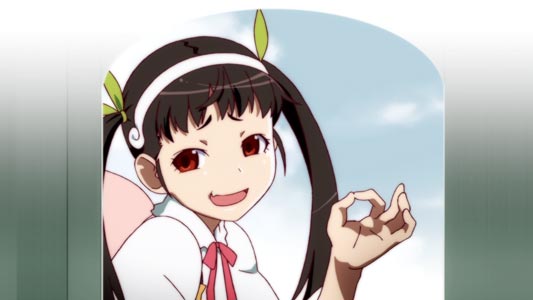
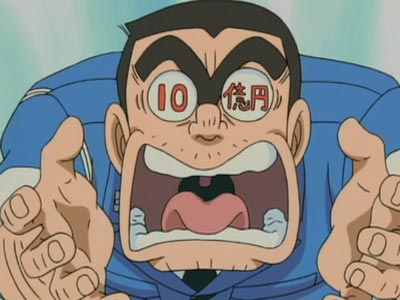
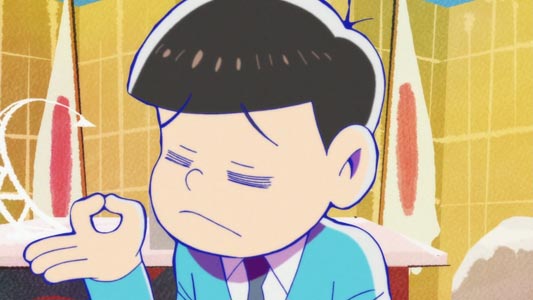
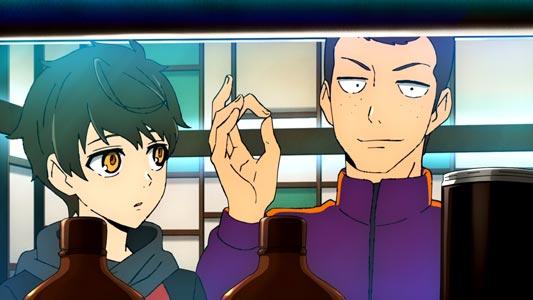
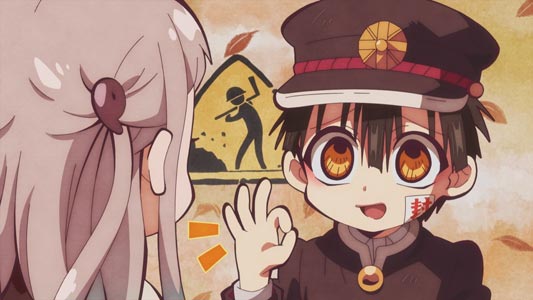
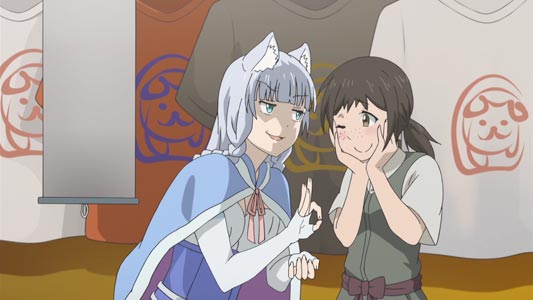
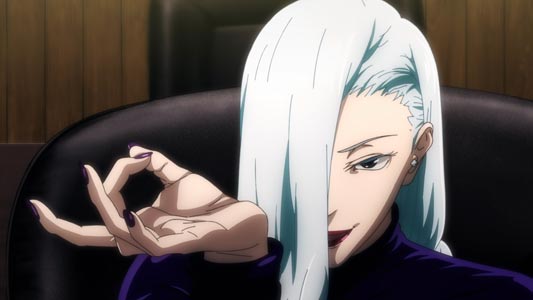
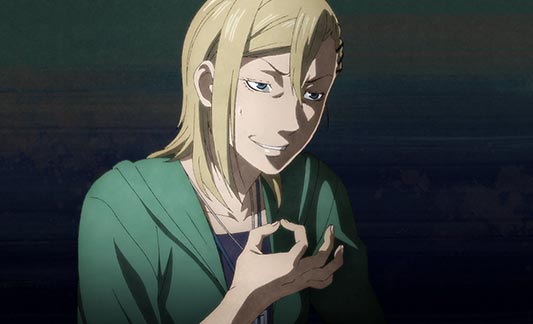
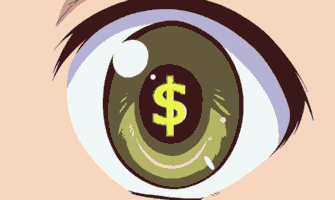
On Osomatsu-san's example, the kanji for "hassou" is written as 発送 (sending), where it should be 発想
ReplyDeleteThanks. I've fixed it.
Delete